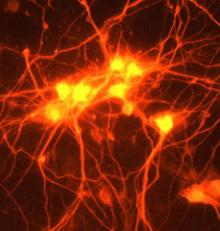
With four new Requests for Applications (RFAs), NIH announces the formation of the BRAIN Initiative Cell Census Network (BICCN), a resource to be used widely by the neuroscience community supporting a center or centers and specialized collaboratories for a mouse brain atlas, collaboratories for human and non-human primate brains, and a data center.
NIH’s first efforts towards surveying brain cell types were initiated in 2014, with diverse pilot cell classification strategies in a variety of species (for more information on the awards, see the “Census of Cell Types” here). With the following new Notices of Funding Opportunities (NOFOs), NIH establishes the BRAIN Initiative Cell Census Network (BICCN), for a systematic generation of comprehensive reference cell census data and relevant tools. The application receipt dates for all four NOFOs is January 23, 2017.
- RFA-MH-17-225 BICCN Comprehensive Mouse Brain Cell Atlas Center
This NOFO will support a Comprehensive Center or Centers for a 3D brain cell reference atlas encompassing molecular, anatomical, and physiological annotations of brain cell types in mouse, and to incorporate cell-specific targeting approaches and tools to facilitate this goal.
- RFA-MH-17-230 Specialized Collaboratory for Mouse Brain Cell Atlas
This NOFO will support a group of Specialized Collaboratories to complement the output of the Comprehensive Center(s). NIH expects each Specialized Collaboratory to focus on one or more of the following: (1) molecular signatures such as transcriptional, proteomic, and epigenetic information; (2) anatomy, including cell morphology and anatomical connectivity; (3) functional measures, such as electrophysiology or assays of functional connectivity; (4) cell specific targeting, including development of novel tools, advanced approaches, or essential information for accessing and manipulating brain cell types.
- RFA-MH-17-210 BICCN Specialized Collaboratory for Human and Non-Human Primate Brain Cell Atlases
This NOFO will support specialized collaboratories to adopt scalable technology platforms and workflows towards reference cell atlases of human and other primate brains. The size, complexity, and variability of primate brains confer unique challenges that these collaboratories will address for the future. Collaboratories may focus on one or a few select brain regions, and are expected to develop and assess scalable and multiplexed approaches for comprehensive cell type surveys.
- RFA-MH-17-215 BICCN Brain Cell Data Center
This NOFO solicits applications for a single center to coordinate data from the BICCN and other interested researchers to establish a web-accessible information system, which will store, analyze, curate, and display all data and metadata on brain cell types and their connectivity. The Cell Data Center is expected to lead efforts to (1) establish spatial and semantic standards, (2) register multimodal brain cell census data to common brain coordinate systems, (3) create searchable digital brain atlases for cell census data, and (4) form a unified and comprehensive brain cell knowledge base that integrates existing brain cell census data and associated information.
The funded projects will be coordinated by NIH staff to build a brain cell census resource that can be widely used throughout the research community. The BICCN will create and maintain fundamental knowledge on cell types and their organizational logic within brain circuits and will provide an open-access 3D reference atlas of the mouse brain, including molecular, anatomical, and physiological annotations, along with pilot data from larger brains. Other goals for the BICCN include reagents for cell-specific targeting and validation of high-throughput, low-cost approaches to enable new research characterizing cell diversity in healthy and diseased brains of multiple species.
Please visit our Active Funding Opportunities page for more details on these and other RFAs for the BRAIN Initiative.
